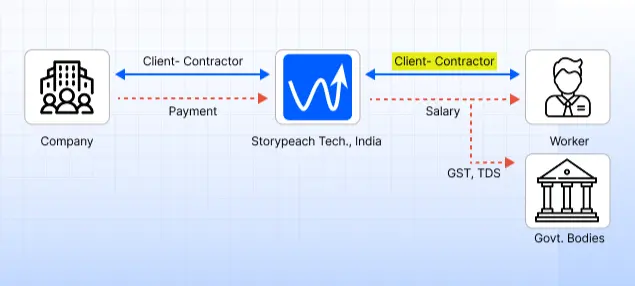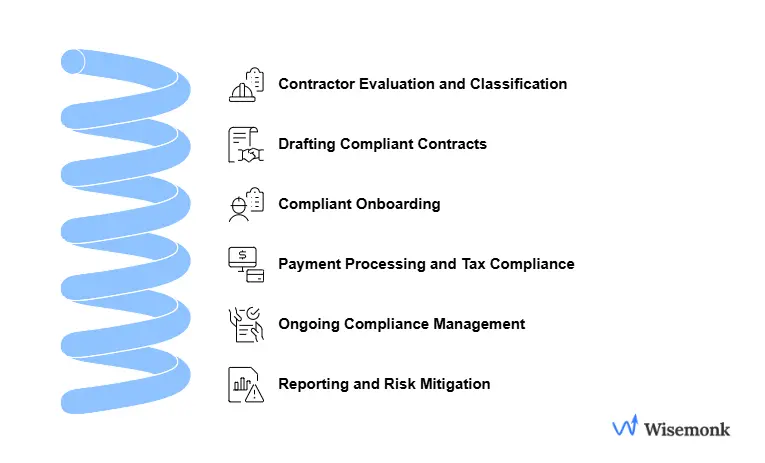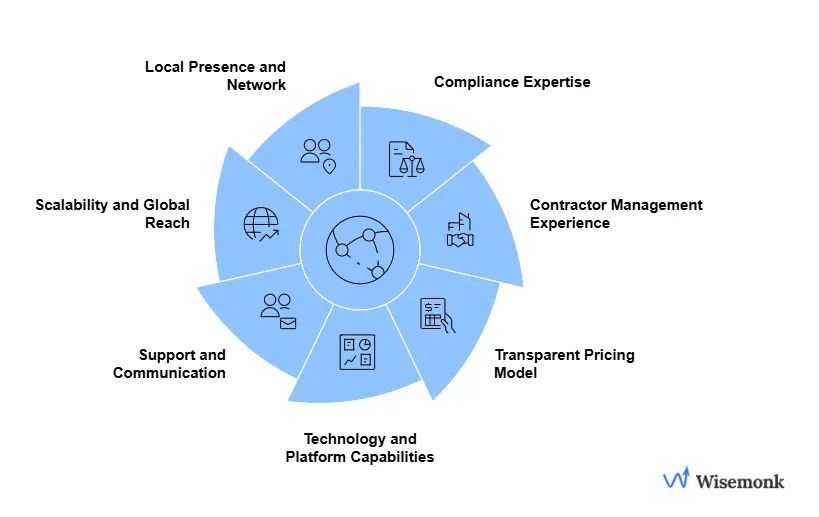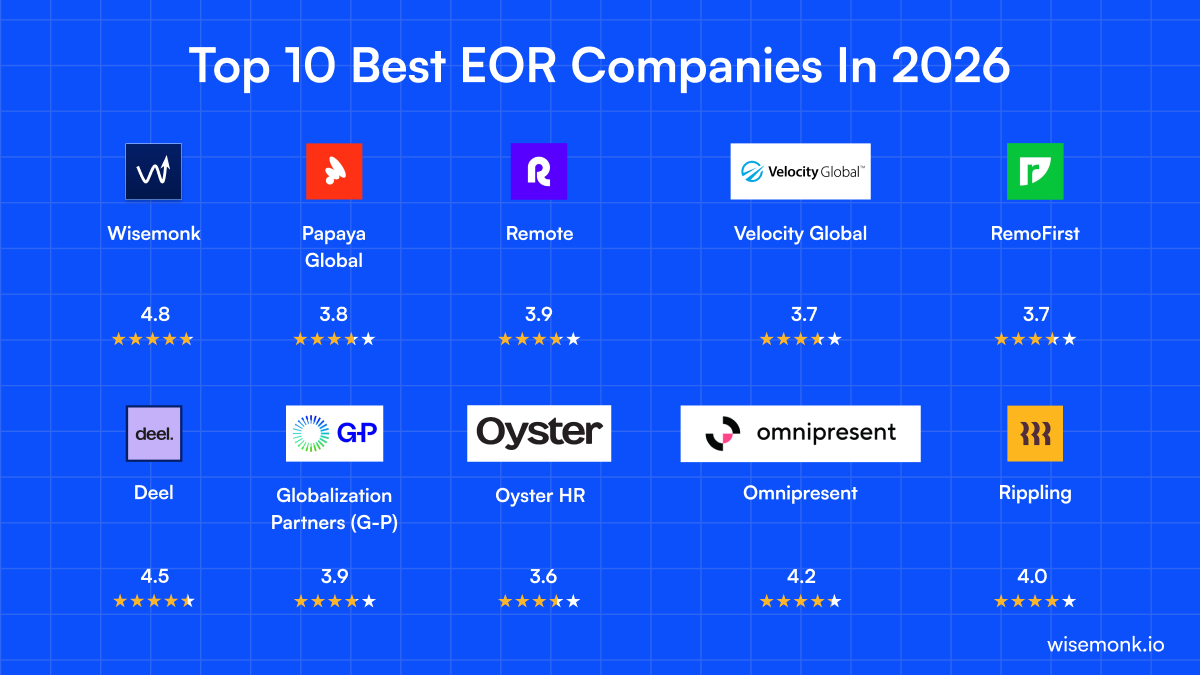- An Agent of Record (AOR) is a third-party provider that manages contractor classification, contracts, payments, and compliance for global teams, keeping you compliant and reducing misclassification risk.
- When choosing an AOR provider, prioritize compliance expertise, transparent pricing, dependable tech, responsive support, and local presence for smooth, compliant operations.
- AOR services include contractor classification, compliant contracts, invoicing and tax management, onboarding, documentation, and ongoing compliance monitoring across regions.
- Key AOR benefits: stronger compliance, lower legal risk, faster onboarding, and accurate on-time payments, so you can manage contractors confidently across borders.
Want to understand if Agent of Record (AOR) is right for your business? Talk to us today!
Discover how Wisemonk creates impactful and reliable content.
Struggling to understand what an Agent of Record (AOR) really does? You’re not alone. Many U.S. founders and HR teams confuse AORs with EORs or think they’re only for large companies, when in fact, AOR services are key to managing contractors compliantly across borders.
In this article, we’ll break down what an Agent of Record is, how the AOR model works, its benefits and limitations, and how to choose the right AOR provider for your business. Let’s make global contractor compliance simple.
What is an Agent of Record (AOR)?[toc=Agent of Record]
An Agent of Record (AOR) is a third-party organization that helps businesses legally engage and manage independent contractors across different countries. The AOR ensures each contractor is correctly classified under local labor laws, manages their contracts, payments, and taxes, and protects the hiring company from misclassification or compliance risks.
Core Responsibilities of an Agent of Record (AOR):
- Contractor classification: Ensures every worker is correctly classified as a contractor under local labor and tax laws.
- Compliance management: Handles documentation, contracts, and filings to keep engagements legally compliant across regions.
- Payment and invoicing: Manages contractor invoicing, tax deductions, and on-time payments in multiple currencies.
- Risk protection: Shields businesses from misclassification penalties, employment liabilities, and Permanent Establishment (PE) risks.
Here’s how an Agent of Record (AOR) works in practice:

What services does an Agent of Record (AOR) offer?[toc=AOR Services]
Agent of Record (AOR) services manage every legal, financial, and compliance-related aspect of working with independent contractors. From drafting compliant contracts and verifying worker classification to handling invoicing, tax deductions, and payments, AOR services make contractor management seamless and risk-free for global businesses.
With our experience supporting companies through AOR, EOR, and compliance operations, here are the key services that an AOR typically provides to simplify and safeguard contractor engagement.
- Contractor classification: Ensures every worker is correctly identified as a contractor (not an employee) under local labor and tax laws.
- Compliant contract creation: Drafts and manages contracts that meet jurisdiction-specific labor regulations and protect both client and contractor.
- Invoicing and payment management: Processes contractor invoices, handles multi-currency payments, and ensures timely payouts.
- Tax and compliance filings: Manages 1099, or W-8BEN filings and ensures all local tax obligations are met.
- Audit-ready documentation: Maintains proper records to support compliance checks and prevent future disputes.
- Ongoing compliance monitoring: Tracks changes in local labor laws and updates documentation or processes as required.
- Contractor onboarding: Collects tax IDs, bank details, and agreements to ensure every contractor engagement starts in full compliance.
- Risk mitigation: Reduces liability for misclassification, payroll errors, and non-compliance penalties through proactive oversight.
Pro tip: Always check if your AOR provider updates labor laws automatically in their platform. Static systems often miss regulatory changes, a common cause of misclassification penalties.
How does an Agent of Record work?[toc=How AOR Works]
From our experience enabling companies to manage contractors through Agent of Record (AOR), here’s how the AOR process works to ensure legal and operational consistency worldwide.

- Contractor evaluation and classification: The AOR begins by reviewing each engagement to confirm whether the worker qualifies as an independent contractor under local labor laws. This prevents employee misclassification and ensures regulatory compliance across jurisdictions.
- Drafting compliant contracts: Once the classification is clear, the AOR prepares legally compliant contracts that define the scope of work, contract duration, payment terms, and termination clauses in line with local employment laws.
- Compliant onboarding: The AOR handles the entire onboarding process, collecting tax forms (W-8BEN, 1099, GST, TDS), bank details, and identity documents. This ensures that every independent contractor is fully verified and compliant from day one.
- Payment processing and tax compliance: The AOR manages payment processing and independent contractor payroll, ensuring contractors are paid accurately and on time in their preferred currency. The AOR also handles tax compliance, including deductions, filings, and remittances to local authorities.
- Ongoing compliance management: Throughout the engagement, the AOR monitors labor law changes, manages contract renewals, and keeps all records audit-ready. This ensures that contractor relationships remain legally compliant and risk-free even as regulations evolve.
- Reporting and risk mitigation: The AOR provides transparent workforce management reports to the client company, helping them maintain operational efficiency, identify potential compliance risks, and take proactive steps to mitigate liabilities.
This structure ensures businesses can manage international contractors confidently without breaching labor or tax laws.
What are the benefits of an AOR?[toc=Benefits of AOR]
Agent of Record (AOR) services help companies manage independent contractors efficiently while staying compliant with local labor laws and tax regulations. By taking care of contractor classification, payments, and compliance tasks, AOR services reduce legal risks and simplify international hiring.
Having guided international businesses through multi-country compliance management, here are the key benefits of choosing a trusted AOR partner.
- Compliance assurance: AOR services ensure every contractor is classified correctly under local labor laws and tax regulations, helping businesses avoid employee misclassification and costly penalties.
- Reduced legal and compliance risks: The AOR takes on full legal responsibility for contractor compliance and filings, minimizing liability and misclassification risks for the client company.
- Faster onboarding and contractor setup: AOR providers streamline compliant onboarding, collecting tax forms, ID proofs, and bank details efficiently, helping companies start projects faster.
- Accurate and timely payments: AOR solutions manage payment processing and independent contractor payroll, ensuring contractors are paid accurately, on time, and in their preferred currency.
- Simplified tax compliance: The AOR handles tax deductions, filings, and remittances as per local tax regulations, keeping every engagement audit-ready and transparent.
- Operational efficiency: By outsourcing administrative tasks like contracts, payments, and reporting, businesses free up internal teams to focus on core growth and global expansion.
- Global reach and scalability: AOR models make it easy to engage international contractors in new markets without establishing a local entity or legal employer structure.
Fact: One major benefit of AOR services is that they help businesses avoid costly tax liabilities. In the U.S., worker misclassification can make companies liable for unpaid payroll taxes, penalties, and interest, according to the U.S. Internal Revenue Service (IRS).
What’s the difference between an AOR, an EOR, and other global hiring models?[toc=AOR vs. EOR vs. global hiring models]
Both Agent of Record (AOR) and Employer of Record (EOR) models help global businesses stay compliant when hiring talent across borders. The key difference lies in who they manage, AORs handle independent contractors, while EORs take responsibility for full-time employees.
Beyond these two, there are also contractor management platforms, staffing agencies, and freelance platforms that support global hiring in more limited or transactional ways.
Let’s look at the main differences between AOR, EOR, contractor management platforms, staffing agencies, and freelance platforms to understand which model best fits your hiring strategy.
Still unsure whether you need an AOR or an EOR? Read our full guide on "AOR vs EOR: Differences Explained" to understand which model fits your global hiring strategy best.
Contractor management platforms offer convenience, but AOR services provide legal protection and compliance coverage, crucial for international engagements.
Freelance platforms connect talent, while AOR providers ensure that engagement stays legal and compliant, a key difference when scaling global contractor operations.
What are the common misconceptions about AORs?[toc=Misconceptions About AOR]
Through our experience helping companies with global compliance management, here are the most common misconceptions about AOR services and the facts behind them.
How to choose the right AOR service provider?[toc=How to Choose Right AOR Partner]
Having supported global businesses with AOR, payroll, and contractor compliance management, we’ve seen that selecting the right AOR provider directly impacts hiring speed, compliance accuracy, and long-term scalability.
Key Factors to Consider When Choosing an AOR Provider:

- Compliance expertise: Choose an AOR provider with deep understanding of local labor laws, tax regulations, and worker classification standards across countries where you operate.
- Proven contractor management experience: Look for an AOR provider that has experience managing independent contractors across multiple jurisdictions, especially in markets with complex regulatory requirements.
- Transparent pricing model: A reliable AOR service provider should clearly outline service fees, invoicing structure, and cost inclusions without hidden charges.
- Technology and platform capabilities: The best AOR services use strong compliance automation, payment tracking, and reporting tools to ensure accuracy and scalability.
- Support and communication: A good AOR provider maintains clear communication, updates clients on compliance changes, and provides prompt support for contractors.
- Scalability and global reach: Pick a provider capable of supporting multi-country operations and scaling as your global workforce expands.
- Local presence and network: An AOR provider with local teams or legal partners ensures faster onboarding, better risk management, and region-specific compliance accuracy.
Looking to hire contractors in India compliantly and with ease? Explore "Wisemonk’s AOR services" and see how we simplify global hiring.
Why Wisemonk is the ideal AOR partner for global teams?[toc=Why Wisemonk is Ideal AOR]
Wisemonk is a trusted Employer of Record (EOR) and Agent of Record (AOR) partner that helps global companies compliantly hire, pay, and manage employees in India, without setting up a local entity. With our deep expertise in compliance, payroll, and contractor management, we make global hiring in India simple, transparent, and risk-free.
Here’s what we offer:
- End-to-end AOR compliance: We manage contractor classification, contracts, tax filings, and payments to ensure every engagement meets India’s labor and tax laws.
- Strong local expertise: Our legal and HR teams ensure all engagements remain fully compliant with GST, TDS, and labor regulations, keeping you clear of misclassification risks.
- Seamless payment management: We handle contractor invoicing, cross-border payments, and currency conversions efficiently, ensuring timely payouts and transparent reporting.
- Dedicated HR and compliance support: Our local specialists assist with onboarding, background checks, and day-to-day HR coordination, so your contractors stay supported from day one.
Beyond core AOR services, Wisemonk also supports companies with recruitment, EOR solutions, payroll compliance, equipment procurement, GCC setup, and India market entry. We act as your on-ground partner to help you build and manage teams confidently, without the complexity of a local entity.
Talk to our India specialists today and discover how Wisemonk can help you manage global contractors with confidence, compliance, and complete transparency.
Frequently asked questions
What does AOR stand for across industries?
AOR can mean different things depending on the context. In global hiring, AOR stands for Agent of Record, meaning a third-party provider that handles compliance, classification, contracts, and payments for independent contractors. In insurance, it refers to the entity authorized to act on behalf of an insured party (e.g. managing insurance policies). In marketing, “Agency of Record” is a term for the primary agency responsible for a company’s advertising and media planning.
How does an Agent of Record help with compliance?
When you work with an AOR, you essentially hand over the compliance heavy lifting. The AOR ensures your contractors are classified correctly under local labor and tax laws, drafts legally compliant contracts, handles tax filings and deductions, and monitors changes in regulations so your engagements stay legal. In doing so, they shield you from many common pitfalls like misclassification penalties or audits.
Which industries benefit most from AOR?
You’ll see the strongest fit for AOR in industries that heavily rely on independent contractors, consultants, or remote project work. Think software, marketing, creative agencies, consulting, content & design firms, and tech startups. Anywhere you need specialized skills for projects but don’t want the full-time employment overhead, an AOR keeps you compliant across borders.
What is the difference between an employer of record and an agent of record?
An Agent of Record (AOR) is used for independent contractors: they don’t become your employee but handle compliance, contracts, and payments. An Employer of Record (EOR), by contrast, becomes the legal employer of workers, handling payroll, benefits, and full employment obligations. Use AOR when you’re hiring contractors, EOR when you want legally employed staff abroad.
Is an agent of record the same as a broker of record?
No. A “broker of record” typically refers to the party authorized to manage insurance or benefits policies on behalf of someone, particularly in insurance industries. An Agent of Record (AOR) in the context of contractor hiring is about contractor compliance, contracts and payments, quite a different function.
What is an AOR letter and why do you need one?
An AOR letter is a formal document that gives an Agent of Record the legal authority to manage contractor compliance, payments, and contracts on your behalf. When you sign it, you’re delegating key compliance and administrative tasks to the AOR so they can act as your authorized representative. The letter clarifies responsibilities and ensures everyone knows who’s accountable during audits or disputes.
When should you terminate or replace your Agent of Record?
You may need to terminate or switch your AOR if there are recurring service issues, compliance lapses, or poor communication. For instance, delays in payments or failure to update you on labor law changes signal it’s time to reconsider. Before ending the partnership, transfer all records smoothly, notify contractors, and sign a new AOR letter if transitioning to another provider.
.webp)
.png)
%20(1).webp)
